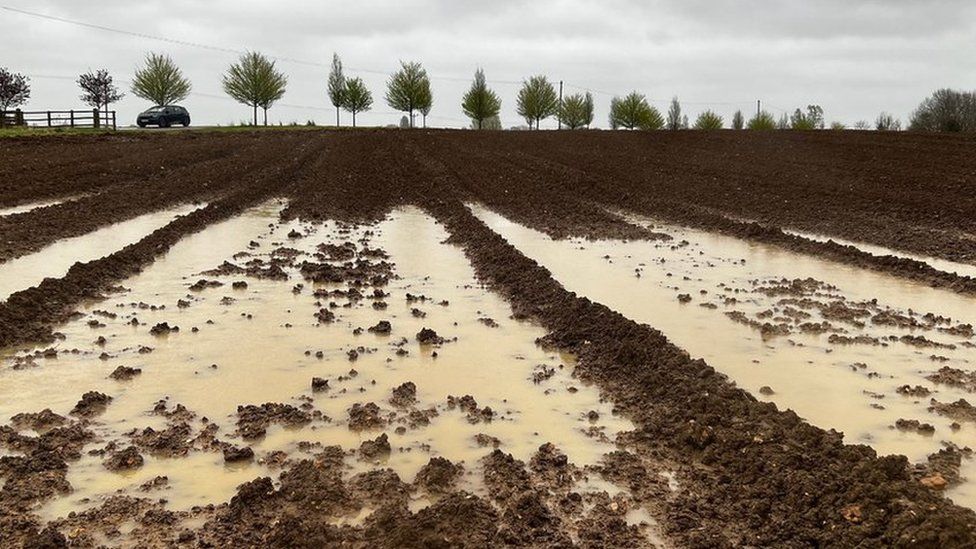
Too wet to work: this field should have been planted three weeks ago
By Dave Harvey
Business and Environment Correspondent, BBC West
The long wet winter has “decimated” farms according to the National Farmers’ Union (NFU).
Tom Collins, who speaks for the NFU in Wiltshire said this winter was “the worst, absolutely terrible”.
Only half of the spring planting has been finished, because many fields are too wet for tractors.
Dairy farmers have had to keep cows in barns longer than usual, and are running out of food.
“It’s bad whether you’re an arable, dairy, beef or sheep farmer,” said Mr Collins.
“The worst winter yet,” said Tom Collins who farms in north Wiltshire
Walking across his arable farm near Malmesbury is heavy going.
Every field is muddy, tractor ruts are full of water.
“We’ve lost 10% of the wheat in this field,” Mr Collins showed me.
Some of the young wheat is up, tender green shoots as high as your hand. But much of the field is muddy, even flooded.
“We’ve had rain non-stop since October,” Mr Collins said. “We’ve already had half the rainfall for this whole year.”
The statistics bear him out. In March, Wiltshire had twice the rain expected, according to Met Office figures.
Across the south of England, February was the wettest since records began in 1836.
Rain has “decimated” the wheat crop in fields like this, according to Tom Collins
Several of Mr Collins’ fields are just ploughed mud fields, waiting for spring beans.
I can barely walk across them in wellies. There is no chance of getting a tractor in to plant seed.
“They should have been in by March,” Mr Collins explained. “If we don’t get them in soon, we’ll be too late.”
He chairs the NFU’s Wiltshire group, and hears similar problems from other farmers.
Beef and dairy farmers can’t get their cattle out, the fields are too wet.
“Now they are running out of straw, which is really expensive, and food too.”
“This is clearly our climate changing,” said Prof Nicola Cannon of the Royal Agricultural University
Also visiting Mr Cannon’s farm was Professor Nicola Cannon, from the Royal Agricultural University in Cirencester.
She has analysed the impact of our changing climate on west country agriculture.
“This is clearly climate change,” she said.
“We’re seeing unstable weather patterns, wetter winters, drier summers.”
Climate is no longer one topic on the syllabus, but is “embedded” in every course.
“We need to build resilience into systems, prepare farmers for a volatile climate.”
Fewer lambs are surviving the wet weather this year
Down on the edge of Exmoor, Charlie Farrington is checking on new-born lambs when I arrived.
He showed me one young lamb barely an hour old, its mother still licking the afterbirth off.
I had arrived in a rare burst of spring sunshine.
“Today is a lovely change,” he smiled.
“I’m afraid we’ve had more than our fair share of dead lambs this year.”
Charlie Farrington has recorded a 50% increase in rain on his Exmoor farm
His flock are a hardy breed, adapted to live on the hill year-round. They have their young out on the fields, often early in the morning.
“With the wind and rain we’ve had, a young lamb is often too vulnerable to cope,” Mr Farrington explained.
“Some die, some are abandoned by their mother as they tend to other new-borns.”
He showed me his “orphan-shed”, where stray lambs are matched with mothers whose own lambs have died.
Using an ancient shepherd practice, the dead lambs are skinned, and the orphans given a makeshift “coat”.
A ewe whose lambs died on the hill has adopted two new-born orphans
The mother then recognises her offspring’s scent, and bonds with the strays.
I watched as a ewe suckled two lambs that she had adopted in this way.
“It’s a happy ending for them,” Mr Farrington explained, “and for us.
“We don’t have to feed them artificial milk and the ewe is earning her keep.”
Charlie Farrington is the third generation to farm here, and he keeps detailed rain measurements.
Until recently, in a typical year they saw 900mm of rain. In 2023 that rose to 1350mm, and so far this year they are already at 450mm.
Tom Collins was also born on his farm, in the Cotswolds. He’s the fourth generation to work this land, and has seen his local climate change.
“I’m no meteorologist but it is definitely getting wetter and warmer,” he said.
“Climate change is definitely happening, you can feel it as a farmer. We are going to have to adapt as farmers, to this wetter climate.”
Follow BBC Somerset on Facebook and, X. Send your story ideas to us on email or via WhatsApp on 0800 313 4630.







